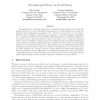Free Online Productivity Tools
i2Speak
i2Symbol
i2OCR
iTex2Img
iWeb2Print
iWeb2Shot
i2Type
iPdf2Split
iPdf2Merge
i2Bopomofo
i2Arabic
i2Style
i2Image
i2PDF
iLatex2Rtf
Sci2ools
102
Voted
TARK
2005
Springer
2005
Springer
Unconditional privacy in social choice
The aggregation of conflicting preferences is an important issue in human society and multiagent systems. Due to its universality, voting among a set of alternatives has a central role among preference aggregation mechanisms. We consider the most general case of voting in which the voters’ rankings of alternatives are mapped to a collective ranking of alternatives by a so-called social welfare functional (SWF). Maintaining privacy of individuals’ preferences is crucial in order to guarantee freedom of choice (e.g., lack of vote coercing and reputation effects), and to not facilitate strategic voting. We investigate whether unconditional full privacy can be achieved in preference aggregation, that is, privacy that relies neither on trusted third parties (or on a certain fraction of the voters being trusted), nor on computational intractability assumptions. More precisely, we study the existence of distributed protocols that allow voters to jointly determine the collective prefere...
Related Content
| Added | 28 Jun 2010 |
| Updated | 28 Jun 2010 |
| Type | Conference |
| Year | 2005 |
| Where | TARK |
| Authors | Felix Brandt, Tuomas Sandholm |
Comments (0)

